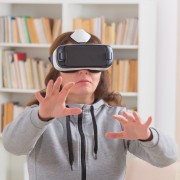VR could be a boon for anxiety disorder patients
The technology might help patients ease their anxiety by providing exposure to computer-generated frightening environments

A growing body of evidence suggests that virtual reality (VR) technology can be an effective part of treatment for phobias, post-traumatic stress disorder, and other mental health conditions.
According to an analysis published in the Harvard Review of Psychiatry in June, VR can potentially be a powerful tool for the psychiatric community.
"It allows providers to create computer-generated environments in a controlled setting, which can be used to create a sense of presence and immersion in the feared environment for individuals suffering from anxiety disorders,” wrote author Dr Jessica L. Maples-Keller of the University of Georgia.
After reviewing the current state of research on VR technology for psychiatric treatment, Dr Maples-Keller and her team found that studies had so far been focused on exposure-based treatment for certain types of anxiety disorders.
Some have evaluated VR applications for progressive exposure to frightening situations in patients with specific phobias, especially the fear of flying. Others have evaluated the use of VR for treatment of post-traumatic stress disorder in combat veterans.
Virtual reality applications can simulate exposures that would be costly or impractical to re-create in real life, such as an aircraft flight or combat conditions. It also enables the therapist to control the "dose" and specific aspects of the exposure environment—for instance, the patient can "virtually" experience repeated takeoffs and landings without actually going on a flight.
Based on available evidence, VR has significant benefits in these types of anxiety disorders. Studies of flight phobia have reported significant and lasting reductions in flight-related anxiety. Patients report satisfaction with VR-based therapy and in some cases find it more acceptable than traditional therapy.
Virtual reality has been studied in a wide range of conditions as well, including panic disorder, schizophrenia, acute and chronic pain, addictions including smoking, and eating disorders. However, research on VR applications has important limitations, including small numbers of patients and lack of comparison groups. The authors note that mental health care providers will need specific training before integrating VR approaches into clinical practice.
"With the cost of head-mounted displays coming down and smaller smartphone applications being developed, it is likely that virtual reality applications will proliferate," the review team concluded. "It will be important that these are treated as tools and therapists are properly trained in their applications."
Related Articles
Will smartphones help diagnose Zika?
The ubiquitous devices might facilitate the diagnosis of the mosquito-borne disease in areas without basic medical infrastructure
Read moreThe battle against ageing
Is a breakthrough that will give us more healthy years on the horizon?
Read moreTelemedicine app begins trial at NHS clinic
The application will allow patients to do video consultation with doctors and pay by using its own cryptocurrency
Read moreLatest Articles
Medical Care
Clinical Exercise Physiologist (CEP): The Emerging of Exercise is Medicine
How Exercising can be a Medicine
Read moreMedical Care
Reversing type 2 Diabetes: Embracing Hope and Determination
Experience the remarkable journey of Ash and his grandfather Atok as they conquer type 2 diabetes through unconventional methods, showcasing the power of love and determination over adversity.
Read moreMedical Care
Bladder Cancer: What You Need to Know
Empower yourself with our comprehensive guide to bladder cancer. Explore symptoms, diagnosis, treatments, and supportive resources to safeguard your health.
Read more